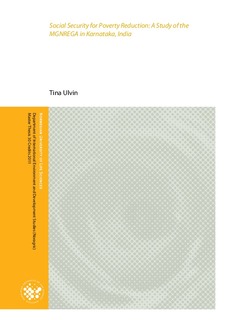| dc.description.abstract | This research addresses the impact of social security in reducing poverty with the
Mahatma Gandhi National Rural Employment Guarantee Act (MGNREGA) in rural
Karnataka, southern India. The MGNREGA was incepted in India in 2006 and stands
out as one of the largest rights-based social security schemes in the world. In brief, the
MGNREGA guarantees annual employment for 100 days to all rural households,
whose adult members are willing to do unskilled manual labor at a minimum wage.
The objectives of the research are to understand the effectiveness of the MGNREGA
on reducing poverty, by identifying the benefits and the challenges of its
implementation. Furthermore, the livelihood framework is used to identify the need
for the MGNREGA in the study area, to be able to understand the contextual
circumstances of how the MGNREGA is meant to bring positive change. A mixed
methods approach was used in collecting the data through a survey, semi-structured
and unstructured interviews. The findings reveal that the MGNREGA was needed in
the study area mainly due to poverty, landlessness and a predominance of backward
caste population. The MGNREGA had provided benefits in terms of durable assets,
employment and income. However, only 7.7 percent of the respondents were
provided employment for 100 days, and over half of the respondents had earned less
than the minimum wage. These findings indicate that the MGNREGA had failed to
fulfill its guarantee to the majority of the respondents. Moreover, the challenges faced
by the implementation of the MGNREGA, was lack of awareness about the rights
provided by the MGNREGA, distrust towards the government in its intention to
implement the MGNREGA in favor of the people, improper maintenance of Job
Cards and the use of contractors and machines in relation to the works conducted
under the MGNREGA. Overall, these findings indicate that the potential benefits of
the MGNREGA to provide social security in the study area have not been fully
realized. | no_NO |
